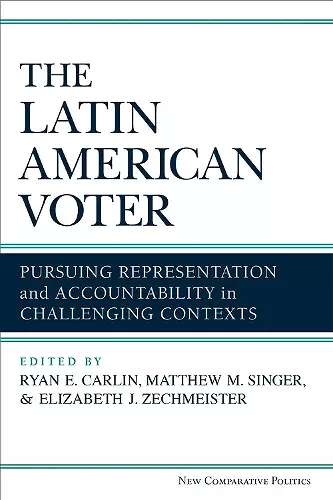The Latin American Voter
Pursuing Representation and Accountability in Challenging Contexts
Ryan E Carlin editor Matthew M Singer editor Elizabeth J Zechmeister editor
Format:Paperback
Publisher:The University of Michigan Press
Published:21st Jul '15
Currently unavailable, our supplier has not provided us a restock date

In this volume, experts on Latin American public opinion and political behavior employ region-wide public opinion studies, elite surveys, experiments, and advanced statistical methods to reach several key conclusions about voting behavior in the region’s emerging democracies. In Latin America, to varying degrees the average voter grounds his or her decision in factors identified in classic models of voter choice. Individuals are motivated to go to the polls and select elected officials on the basis of class, religion, gender, ethnicity and other demographic factors; substantive political connections including partisanship, left-right stances, and policy preferences; and politician performance in areas like the economy, corruption, and crime.
Yet evidence from Latin America shows that the determinants of voter choice cannot be properly understood without reference to context—the substance (specific cleavages, campaigns, performance) and the structure (fragmentation and polarization) that characterize the political environment. Voting behavior reflects the relative youth and fluidity of the region’s party systems, as parties emerge and splinter to a far greater degree than in long-standing party systems. Consequently, explanations of voter choice centered around country differences stand on equal footing to explanations focused on individual-level factors.
“The Latin American Voter makes a unique, first contribution to a neglected area of electoral behavior. Can the Latin American voter be explained? The authors answer ‘Yes,’ with the proviso that Latin American voters are different. Voting in this region, they conclude, depends on context, heterogeneity, institutions, country, and ballot choices. In sum, they discover the Latin America voter as not one, but many. This perhaps surprising finding deserves a careful read by anyone wanting to understand elections in this part of the world.”
—Michael S. Lewis-Beck, University of Iowa
ISBN: 9780472052875
Dimensions: unknown
Weight: unknown
444 pages